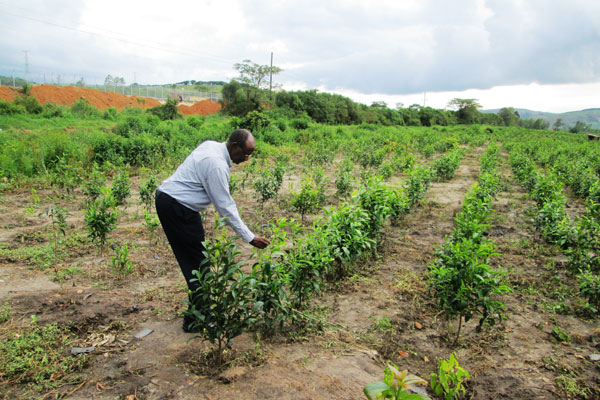Prime
Ntungamo struggles to keep tea enterprise dream

Former Ruhaama County Member of Parliament Augustine Ruzindana in his tea plantation in Ntungamo District. PHOTO/FILE
What you need to know:
- A report seen by this newspaper shows 27 companies were expected to supply 51,234,767 seedlings to 1,013 farmers.
- The report authored by Ms Atwine on February 17, 2022 indicates that 46,532,856 seedlings dried up in nurseries and gardens.
When tea growing was introduced to Ntungamo District as an enterprise in 2014, the government viewed it as a feasible business that would improve farmers’ livelihoods and pull through a reasonable profit.
The government injected more than Shs11.8b through the National Agriculture Advisory Services (NAADS) for the enterprise.
The money was meant to provide seedlings, extension services and establishing model gardens.
Kigezi Highland Tea Company was contracted to put up tea nursery beds in Ntungamo after which they were supposed to plant for the willing farmers, take care of the gardens for three years and hand them over to the farmers for management.
Challenges
More than 8 years later, Ntungamo District officials say the project has been mishandled and misconceived by farmers despite the goodwill of the government.
“The initial stages of development were misconceived and our systems were never well engaged since the district officials were not involved when picking relevant farmers. We were ordered by Naads to sign and make agreements with nursery operators that we never understood,” Ms Esther Atwiine, the Ntungamo District agriculture officer, said last week.
Currently, only 35 farmers grow tea.
The farmers have since formed a Sacco to ease coordination and mobilisation.
Mr Ndibarema WaBeitwababo, the chairperson of the Ntungamo Tea Growers Cooperative Society, said tea farmers faced numerous challenges since the project’s inception.
Key issues
“There was no sensitisation of the farmers at the initiation stage.
The nursery operators were just dumping their seedlings and asking for money and most of the gardens planted were neglected.
In 2015, the project commenced with 101 enthusiastic farmers, we now have 35,” Mr Ndibarema said.
He added: “We are becoming frustrated. 16 districts applied for tea seedlings. But Ntungamo has not been considered because we don’t have nursery beds. Nursery operators are businessmen and we are farmers. For us we want to plant.”
The Ntungamo District vice chairman, Mr Asuman Kigongo, who is also secretary for production and marketing, said:“When you evaluate the amount of money paid to nursery operators, Ntungamo would now be a tea district with more than 1,000 farmers. But these people were paid without supplying anything,” Mr Kigongo said.
A report seen by this newspaper shows 27 companies were expected to supply 51,234,767 seedlings to 1,013 farmers.
The report authored by Ms Atwine on February 17, 2022 indicates that 46,532,856 seedlings dried up in nurseries and gardens.
Mr Ndibarema said there are currently 203 acres of active tea gardens across the 1,015 villages.




